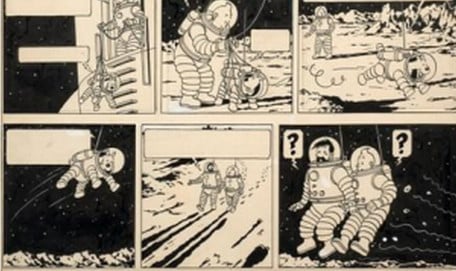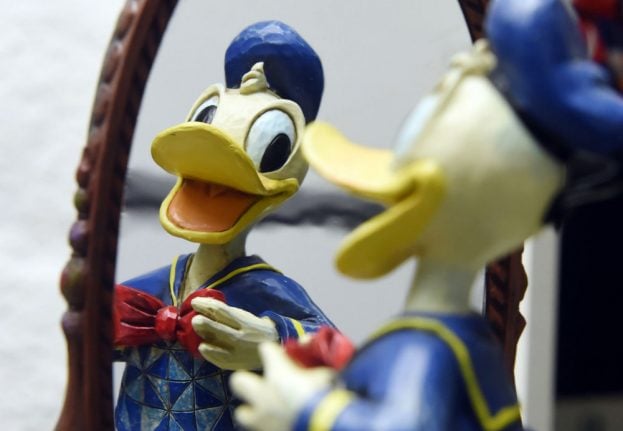CARTOON
Tintin drawings sell for record €1.55m at Paris auction
An original drawing from Tintin's "Explorers on the Moon" sold for a record €1.55m at a Paris auction on Saturday, auction house Artcurial has announced.
Published: 19 November 2016 13:01 CET

The strip shows Tintin's dog snowy in his won space costume. Photo: Artcurial
The 50 cm X 35 cm drawing in Chinese ink by the Belgian cartoonist known as Herge shows the boy reporter, his dog Snowy and crusty sailor Captain Haddock wearing spacesuits and walking on the moon while looking at Earth.
It had been expected to sell for between €700,000 and €900,000 ($741,00 and $952,000).
Artcurial's comics expert Eric Leroy described the “Explorers on the Moon” as “a key moment in the history of comic book art… it has become mythic for many lovers and collectors of comic strips.
“It is one of the most important from Herge's postwar period, on the same level as 'Tintin in Tibet' and 'The Castafiore Emerald',” he added.
The 1954 book is viewed as one of Herge's masterpieces.
Saturday's sale was a record for a single cartoon drawing. Herge already holds the world record for the sale of a comic strip.
A double-page ink drawing that served as the inside cover for all the Tintin adventures published between 1937 and 1958, sold for $3.7 million to an American fan two years ago.
Rival auction house Christie's is putting drawings from another rare Herge strip up for sale later in the day in Paris.
It said the page from the unfinished story “Tintin and the Thermozero” — estimated at 250,000 euros — was the first ever to come to market.
Why the artist never finished the tale of espionage and a terrifying secret weapon set against the backdrop of the Cold War, is one of the great mysteries for Tintin-ologists.
The 1954 “Explorers on the Moon” completes the lunar adventure started in “Destination Moon” (1953) and features several hilarious episodes including Haddock getting drunk on whisky and floating off into space to briefly become a satellite of the asteroid Adonis.
It turns on Tintin foiling a plot by a mysterious foreign power to hijack the rocket by the evil stowaway spy Colonel Jorgen.
The moon drawings are being sold alongside 20 ink sketches Herge created for a series of New Year's greeting cards known as his “snow cards”.
Prices for cartoon art have multiplied tenfold in the last decade, according to gallery owner Daniel Maghen, who also works with comic art.
The sales comes as Tintinmania again grips the French capital, with Herge currently the subject of a huge retrospective exhibition at the Grand Palais.
Url copied to clipboard!



 Please whitelist us to continue reading.
Please whitelist us to continue reading.
Member comments